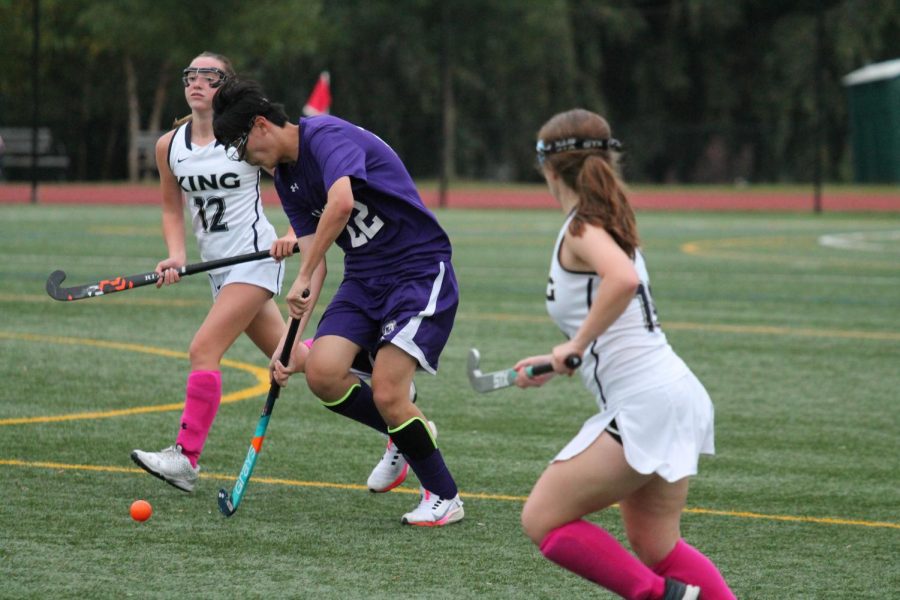Mixed-gender Playing Betters the Game
October 27, 2021
Athletics for boys and girls have been played differently from the start because of outdated norms and stereotypes built around the genders – boys are more aggressive and girls are more timid. As society has evolved and advancements have been made in the workplace and in politics, sports have made slower progress in regard to gender and acceptance. Allowing boys and girls to participate in coed sports allows girls to build up their confidence and strength in the sport while going up against stronger athletes, and it allows boys to focus on their technique and possession. In the eyes of a field hockey team, there is no reason why boys and girls should not be able to play against one another since the boys are able to adapt in the sport, as are the girls.
Girls team sports tend to be more geared to possession and technical skill while boys sports are primarily fixed on teaching the players to be more aggressive. After encountering coaching from both gender perspectives, I have come to the conclusion that from the beginning the fundamentals of sports are presented differently depending on which gender is being coached and therefore boys and girls become different kinds of players for the most part.
The reason behind this difference stems from the education about gender that was deeply ingrained from a young age, both inside and outside the world of sports. As girls, we are constantly told that we are weaker than boys, which may be true in some aspects from a biological standpoint, but does not mean we have to translate that into being meek while competing within our own gender. The stereotype of the “weaker-than-the-boys” girl, which is often reinforced, even if in a subtle way, by faculty and teachers has resulted in girls tending to be less aggressive on the field. A prime example of this is girls vs. boys lacrosse. It would be dangerous for a girl to play in a primarily boy dominated lacrosse game but it would not be dangerous for a girl to play in a girls lacrosse game where boys’ rules are applied. The dilemma in the current world of sports and in society is that the message that boys are stronger than girls is often translated into girls being weaker players in general.
My own experience playing soccer with boys from a young age has made me a better, more aggressive player, though as a girl who is told she is “too aggressive in the field,” I admit that I have sometimes played into the idea that girls are weaker than boys and should be more timid on the field. Compared to other girls on the soccer field, I am seen as more aggressive – though if I were placed in a boys game, my aggression would not be frowned upon, not because of my strength against the boys, but because of my willingness to step to the ball and face it in one-on-one contact on the field. This is because I have had the experience of playing against boys, allowing me to be more comfortable fully using my body on the field. This would not be possible without my introduction to coed soccer, mainly because of the fundamental limitations I felt at a younger age regarding the way girls play.
As an experienced athlete who has been involved in coed and gender separated sports, I’ve noticed that games are played very similarly when coed for girls at a higher level. However, for boys, the games tend to be much more contact heavy and calls are made less often when the games are gender separated. After having the opportunity to play coed soccer with D1 athletes as a junior in high school, I have realized that at a certain skill level, the game comes down to technique and confidence. When boys and girls play together, the sport incorporates more skill and less aggression on both sides. Though there is contact present, the contact levels are less than in a primarily male-dominated game. Boys may be stronger than girls, but there is no proof boys are capable of having better technique and skill than female players.
As I became more aggressive on the field, my coach’s immediate reaction was to move me to defense since, “I was too aggressive to play up top.” This is due to the fact that there is a general lack of aggression on the field from the girls and in turn, I stood out. Because I was exposed to playing with boys early on, I have had the freedom and opportunity to develop more assertive skills on the field.
Allowing the Masters Field Hockey Team to be coed allows both the girls and boys on the team to benefit from working together on the field as the girls will be able to become more confident stepping to the ball and the boys to work on their technique. Permitting the team to play as coed is a step in the right direction to allowing girls to become more confident on the field.




